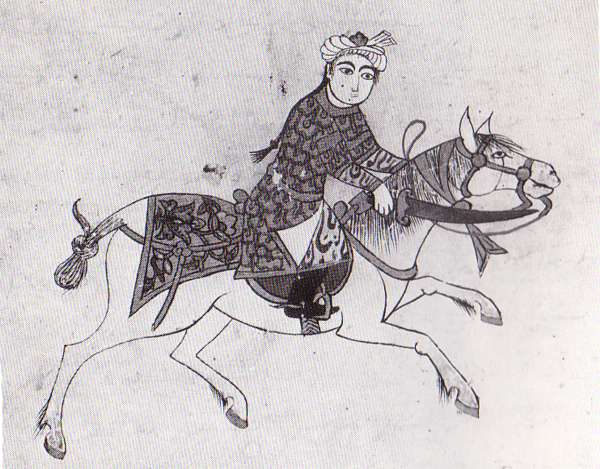
AUGUST 2004
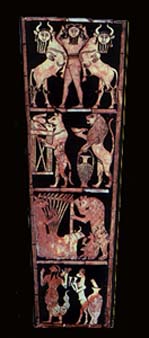 Impiety of Arab societies serves as
main problem
Impiety of Arab societies serves as
main problem in middle East
By Tamim al-Barghouti
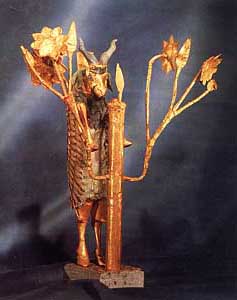
Special to The Daily Star
Tuesday, July 20, 2004
Arab liberals and neoliberals typically believe that the European Renaissance was in essence a process of cultural selection. The new Europeans slowly but surely rejected the backward elements in their culture, namely religion, in favor of the more progressive secular ones. Accordingly, Arab liberals argue that we need to do the same; we need to quarantine Islam out of political and social life and depend instead on other secular historical institutions.
The main difficulty faced by the proponents of such ideas, however, is that there are almost no such institutions. As far as the vast majority of the region's population is concerned, before the first colonial encounters in the Middle East it was truly difficult to find any institution, from family to Empire that was not affected by Islam.
Only the modern nation state, designed and installed in the Middle East by European colonial powers, is truly secular in that sense. This historical relationship between liberalism and colonialism has therefore caused many in the region to be suspicious of truly honest liberals. Many a Cambridge and Harvard educated Arab liberal were unable to overcome this obstacle.
On the other hand, Islamists argue that the main problem is not our lack of secular modern
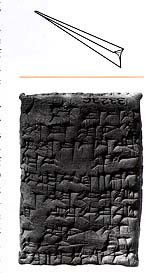 institutions, but rather the
impiety of our societies. To an Arab Islamist, the
problem is not that we have too much of Islam in our
social and political life, but quite to the contrary: we
do not have enough of it. But our Islamists forget that
they have been making the same argument for the last 800
years, from the second Abbasid era on. If a solution to a
problem was being proposed for so long and the problem
still persisted, it is only legitimate to doubt both
diagnosis and prescription.
institutions, but rather the
impiety of our societies. To an Arab Islamist, the
problem is not that we have too much of Islam in our
social and political life, but quite to the contrary: we
do not have enough of it. But our Islamists forget that
they have been making the same argument for the last 800
years, from the second Abbasid era on. If a solution to a
problem was being proposed for so long and the problem
still persisted, it is only legitimate to doubt both
diagnosis and prescription. Moreover, many medieval Islamic thinkers imagined the movement of history as a steady linear decline from the time of the Prophet to the Last Day. Many modern day Islamists believe in the same. Not only does such an understanding of history prevent positive efforts
towards the betterment of society, it also contradicts the main argument of the same Islamists that more piety and religiosity can save the world. It seems the world can never be saved. The overwhelming power of such a prescription has been the backbone of Middle Eastern politics from the time of Ibn Taymiyya on, that is, from the Crusades up until today, and still it did not work.
How do people move from a period of defeat to one of triumph? How do the holders of a certain set of creeds overcome historical moments of confusion? Copying the experiences of others is definitely not the way; the failure of colonially created states to do anything other than colonizing their own peoples is good proof. Reducing one's rich culture into only one of its dimensions does not work either - our history since the Mamlouks bares witness to that. This is true for us and true for Europe.
| Ralph Nader: First of all, we have been supporting despots, dictators, and oligarchs in all those states for a variety of purposes. We supported Saddam Hussein. He was our anti-Communist dictator until 1990. It’s also cultural; they see corporate culture as abandoning the restraints on personal behavior dictated by their religion and culture. Our corporate pornography and anything-goes values are profoundly offensive to them. |
| Selected
Members of Sumerian Pantheon Anu......................sky god, head of pantheon Ishtar...................queen of heaven, wife of Anu Abu.....................god of vegetation Enki....................god of wisdom, ruler of waters Enlil....................."lord of breath," lord of the winds and of the earth Indugud...............storm god Nanna.................moon god Shamash............sun god |
Looking at the art of the
renaissance, the beautiful churches of the thirteenth
century, one cannot see any process of cultural selection
and exclusion, rather, one sees an indulgence in culture
with all it elements. The frescos showing the trinity,
the Madonna and the child or the annunciation, as well as
the works of sculpture could very well be works of pagan
Romans, the Heavenly Father looks very much like Zeus,
the image of Christ is not very different from that of
Apollo, Michelangelo's David looks like statues of
ancient Greek athletes, but still the works are extremely
Christian. This amalgam of two contradictory elements in
European culture is fascinating. 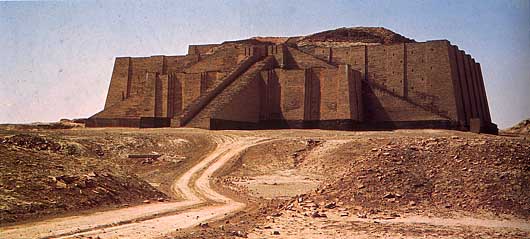
Ziggurat
of King Urnammu, Ur (El Muqeiyar), Iraq. c. 2100 BC
But that's not all; the dresses of the characters from
the Bible and their surroundings are those of the Italian
Renaissance. The effect of seeing the Madonna in a 13th
century gown must have had a similar effect to depicting
Moses in a pair of jeans today. Culture was not left
hanging up in heavens. Rather these frescoes brought the
divine images back to earth. Legend is brought to the
breakfast table and culture in all its complexity,
without selection or exclusion, is mixed with the
people's everyday bread. Moreover, culture is not
fortified against foreign influence; rather, whatever is
foreign is absorbed and made absolutely native.
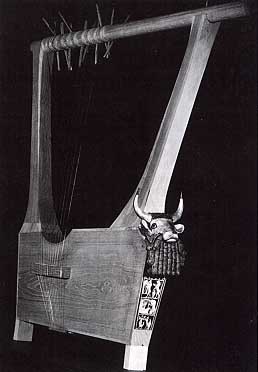
Bull headed lyre from
the tomb of Puabi, Royal Cemetery, Ur, c. 26,000 B.C.
Gold leaf and lapis lazuli over a wooden core, approx. 5'
5" high.
The black and white stripes on the walls of the Cathedral
at Siena have an amazing story. They directly recall the
stripes of the Damascene Mamlouk houses and mosques,
something Italians must have learned about from their
continuous trips to the Middle East during the Crusades.
But here is how they fit it into their own story. After
Romulus killed his brother Ramous, the latter's children
fled the newly founded Rome to Siena. Before they reached
the city, they burnt offerings to the gods and two
columns of smoke rose to the sky, one black and the other
white. The black and white stripes which were adopted for
aesthetic reasons were woven into the culture of the
region. Dante's Divine Comedy is also like that, very
Roman, very Christian and very much the product of
Renaissance Italy.
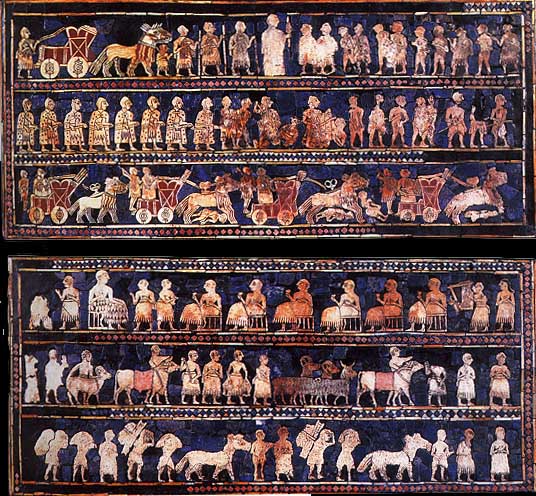
The
Standard of Ur. Front and back sides. C. 2600 B.C. Wood
inlaid with shell, limestone, and lapis lazuli, height
8".
In the Arab world such indulgence in our culture is
needed. Islam too is needed - not one that turns the
Companions of the Prophet into distant demigods but
rather one that brings them to our breakfast table. For
they were but some of us. An engagement with our
culture is a key to any process of selection among the
elements.
Tamim al-Barghouti is a Palestinian poet who writes a
weekly article
for The Daily Star
| Ancient Near Eastern History | ||
| Chronology | Provenance | |
| 3500 BC - 3000 BC | Protoliterate Period | Sumer |
| Wheeled carts & potter's wheel in use | ||
| Invention of writing | ||
| 3000 BC - 2300 BC | Early Dynastic Period | Sumer |
| Epic of Gilgamesh | ||
| 2300 BC - 2150 BC | Akkadian Dynasty | Akkad |
| 2150 BC - c.1960 BC | Third Dynasty of Ur | Sumer |
| c. 1760 BC - 1600 BC | Babylonian Empire | Babylonia |
| Babylonian mathematics flourish: use of whole numbers, fractions and square roots | ||
| 1600 BC - 1000 BC | Kassites and Mitanni | Mesopotamia |
| Hittites | Anatolia | |
| Middle Elamite Period | Elam | |
| c. 1350 BC - 612 BC | Assyrian Empire | Assyria |
| 612 BC - 538 BC | Neo-Babylonian Empire | Babylonia |
| Conquer Egypt 605 BC | ||
| Conquer Jerusalem 586 BC | ||
| 538 BC - 330 BC | Persian Empire | Persia |
| 330 BC - 224 AD | Greco-Roman Period | Mesopotamia |
| 224 AD - 636 AD | Sasanian Dynasty | Mesopotamia |
Amilcar Cabral, the Great
Son of Africa who founded the modern African Liberation
Movement had this to say in his book Return to the
Source. "When all else has failed, it is to our
culture that we turn." He points out, "When you
take up arms to dominate a people, it is above all to
destroy the cultural life of a people, or at least to
neutralise or paralyse their cultural
life."................. "History teaches us
that what ever may be the material aspects of a peoples
domination, this domination can only be maintained by the
permanent organised oppression of the cultural life of a
people."
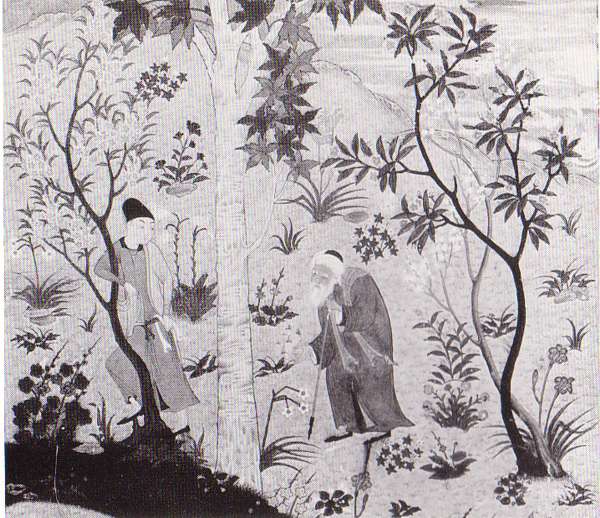
BERLIN, GERMANY.
ARAB MUSLIM CONGRESS
FRIDAY -SATURDAY-SUNDAY 1-2-3 OF OCTOBER 2004
A call for the congress of Berlin
A call to the nation, to the country and to the Arab and
Islamic communities
The Arab and Islamic World and the whole humanity are
suffering under hatred, under catastrophes, under bloody
massacres and under occupation and oppression . Instead
of reaching liberty and self determination and living in
peace the struggle is still going on between the Arab
people in occupied Palestine, in occupied Lebanon, in
occupied Iraq and in occupied Syria, and the part of
injustice, of occupation and of aggression against the
peaceful towns and villages as well as against people,
civilisation and religions. The colonial countries
steadily assisted this aggression, first of all by the
USA The last chain in this barbaric aggression lies in
the offensive against the resistance movement that is
defending the bare existence of the people in their
countries and abroad.
The resistance movement is carrying to the international
community the principle and the goal of life in freedom
independence and self-determination
The whole world is carrying and facing a historic
responsibility in the defence against occupation,
oppression, aggression and injustice
We declare the constitution of our congress in the city
of Berlin / Germany
No, to colonialism, - no to slavery, - no to Zionism and
racism, - no to imperialism
No ,to American hegemony,
No, to the globalisation of death and aggression, - no to
the destruction of moral and virtues
No, to the commerce of slaves and countries
No, to the American Zionist terror
Yes to the world's popular and general resistance for the
sake of freedom, independence and just peace
:For the realization of these goals we propose the
constitution of a broad popular European coalition to
face American and Zionist terror
Intensifying and strengthening the brotherly ties and
relations between the descendants of the same nation in
the countries of immigration
Finding the suitable ways to coordinate the efforts to
unify our people in the countries of origin and
immigration
Sending a clear message to whom it may concern that we
are deeply related to our countries of origin and that we
are well concerned with the daily suffering of our people
and its pleas and its disrespected rights
All of you are called to contribute, assist and attend
the works of the first constituting Arab Islamic European
congress of the Arabic, Islamic and friendly communities
in Europe: Parties, organisations, societies, syndicates,
politicians, thinkers, people of culture and literature,
all among the broad parts of society in the European
continent and from the different parts of the Arab and
Islamic World
We call for the days of support of the resistance and its
people in Palestine, Iraq and elsewhere in the Arab
countries and all over the world For the support of
the right of peoples to defend against aggression, war
and occupation For the right of people in independence,
freedom, sovereignty and peace
BERLIN,
GERMANY. ARAB MUSLIM
CONGRESS
FRIDAY -SaTURDAY-SUNDAY,1-2-3 OF OCTOBER 2004
For more details- applications
-donnations-informations
pls call
lccpress@yahoo.com
EFAMC2004@YAHOO.COM
lccpress@lebanonview.com
from togethernet@yahoogroups.com
dear friends I think that it is important that
the Asembly in Berlin decided to have a plenary in Lndon
at the ESf 2004 about Palestine It' called What future for Palestine
I do think it's
important that we try to network around the countries to
organize a workshop about actions to be taken at an
international level after the ESF in Europe
We cannot carry on only
with single separate actions which are important,
but it will be great to call for European and world wide
actions about several issues like: The occupation ;The wall ;The boycott campaign the distruction of houses . After the decision of the ICJ
(International Court of Justice) in Hague it's time for
us to become stronger and united mariangela Manchester Forum for Palestine
